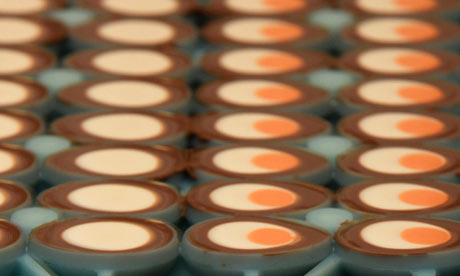
Many of Britons' guiltiest food pleasures such as sweets and cakes need to become less bad for us in order to improve the nation's health, the government's food experts urged today.
Cakes, biscuits, chocolate bars and buns should contain less saturated fat, and fizzy drinks less sugar, the Food Standards Agency told manufacturers of sweet foods. The products have been singled out by the agency because they account for much of people's intake of saturated fat and calories.
The agency wants manufacturers to prioritise cuts in these ingredients in their top-selling products and to introduce smaller sizes of chocolate bars and soft drinks.
Companies such as Mars and Cadbury should cut by at least 10% the saturated fat content of chocolate confectionery containing fillings, plain sweet and savoury biscuits, and plain cakes, it says. Other biscuits and cakes should lose 5% of their saturated fat content. Fizzy drinks need to contain 4% less sugar, and should start to be available in 250ml cans as well as the existing 330ml ones, to encourage lower consumption.
Saturated fat can increase the risk of heart disease, while soft drinks have been blamed for the obesity epidemic and are linked to pancreatic cancer, and liver and kidney disease.
The agency is preparing to issue similar advice in the summer for reducing the amount of saturated fat in dairy and meat products, pastries and savoury snacks.
It has used voluntary agreements with some food manufacturers in recent years to achieve reductions in salt content. That has helped produce a drop in average adult daily salt intake from 9.5g to 8.6g; official dietary advice recommends a maximum 6g.
"It's courageous of the Food Standards Agency to be extending its reformulation programme into the tough area of sweet foods because these are very popular products to which people have a lifelong bonding due to their texture and sweetness," said Professor Jack Winkler, a nutrition policy expert. "They are consumed a lot and contribute significantly to obesity."
Lucy Jones, a dietitian and spokeswoman for the British Dietetic Association, which represents dietitians, praised the agency's "really positive step forward" but pointed out that firms such as Heinz and Campbell's had not complied with the agency's previous drive to reduce salt when making their soups.
"My concern with these new recommendations is that some manufacturers will reduce the saturated fat and sugar in their products and some won't, and that will leave a potential minefield for the consumer," said Jones.
She said smaller portion sizes were an excellent idea "but there may be a loophole because [manufacturers] will end up charging more for them, so consumers are likely to end up continuing to choose the bigger sizes because they are cheaper".
Richard Watts of the Children's Food Campaign said the initiative was "not enough". "Simply taking 80ml off the size of a can of Coke won't do much to help, especially given how much fizzy drinks help fuel the obesity problem. The FSA needs to tell people to drink substantially less of the stuff and persuade the public in a clear way that things like sugary snacks are treats to be consumed rarely."
The Food and Drink Federation and the British Soft Drinks Association refused to commit themselves explicitly to implementing the recommended changes. Both stressed their member firms' track record of previous reformulation and commitment to do more.
But Pepsico, which makes Pepsi and other top-selling fizzy drinks, pledged to make the 4% cut in sugar and introduce 250ml cans.

